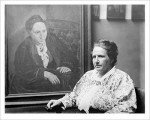Books of the Year, 2008
A couple of weeks ago, London’s Times Literary Supplement (TLS, Nov. 28, 2008) published its “Books of the Year” issue, kicking off the “best of 2008” season. It’s an annual ritual in which TLS asks 40 or so writers to name books they’ve liked in the last year.
The cast of reviewers runs alphabetically from Thomas Ades to A.N. Wilson this year, with such luminaries as A.S. Byatt, Margaret Drabble, Doris Lessing, Joyce Carol Oates, George Steiner, and the Archbishop of Canterbury, Rowan Williams, sandwiched in between. The head of the Anglican Church unsurprisingly picked Canadian philosopher Charles Taylor’s rather Anglican A Secular Age as one of his books of the year; less predictably, he also chose the biography of a Marxist cultural critic, Dai Smith’s Raymond Williams: A Warrior’s Tale.
The TLS end-of-the-year exercise is a generally pleasant, unpretentious affair that permits thoroughly idiosyncratic selections: poet Craig Raine liked Ruth Rogers and Rose Gray’s The River Café Cook Book; while Nobel Prize-winner Lessing raved about Alberto Manguel’s 2006 meditation on civilization, The Library at Night; and polyglot critic George Steiner prefered the Ingeborg Bachmann-Paul Celan correspondence, Herzzeit (in German). Other choices were a bit more conventional: among the fiction picks, Nadeem Aslan’s The Wasted Vigil, Sebastian Barry’s The Secret Scripture, and Joseph O’Neill’s Netherland took a bow here, having been widely praised in other venues.
The TLS procedure produces a cheery patchwork rather than a definitive list, and the resulting literary crazy quilt can include everything from Barack Obama’s decade-old Dreams From My Father (the TLS isn’t fussy about dates of publication) to Rabindranath Tagore’s 1927 novel, Relationships (apparently, a new translation turned up this year), to classicist Mary Beard’s exotic choice of Il Papiro di Artemidoro, a possibly fake ancient papyrus that nonetheless arrives in a deluxe edition (with DVD) for a mere 480 euros. What makes the TLS roundup unpretentious is that nobody pretends that these are the absolutely “best books” of the year; they’re just the personal favourites of a bunch of interesting writers.
On the other hand, The New York Times Book Review (NYTBR, Dec. 14, 2008) is definitely definitive about its “The 10 Best Books of 2008.” Its five fiction picks are: Steven Millhauser, Dangerous Laughter; Toni Morrison, A Mercy; Joseph O’Neill, Netherland; Roberto Bolano, 2666; and Jhumpa Lahiri, Unaccustomed Earth. In non-fiction, NYTBR names: Jane Mayer, The Dark Side: The Inside Story of How the War on Terror Turned Into a War on American Ideals; Dexter Filkins, The Forever War; Julian Barnes, Nothing to be Frightened Of; Drew Gilpin Faust, This Republic of Suffering: Death and the American Civil War; and Patrick French, The World Is What It Is: The Authorized Biography of V.S. Naipaul. Reactions to the list from NYTBR readers found it to be a trifle on the dull and safe side. Comparable “Best 10” lists have or will soon appear in newspapers and on websites across the globe, from Amazon.com—its editors picked Philip Hensher’s novel The Northern Clemency as its book of the year—to Vancouver’s online newspaper The Tyee, which put together a potpourri of Xmas recommendations.
I rather prefer the haphazard TLS selection method. However, for some unaccountable reason, TLS once again this year forgot to ask me for my picks, and so I have to post them on a mere million-or-so-hits-a-day website rather than in the obscure pages of the venerable English literary journal. Oh, well. Here goes:
In Nobel Prize-winner Jose Saramago’s newly-translated novel, Death with Interruptions (Harcourt, 2008; first published two years ago), the 85-year-old Portuguese fabulist offers us his latest “what if” thought experiment. In this mordantly comic tale, death takes a holiday and people suddenly stop dying on New Year’s Eve in an unnamed landlocked country of 10 million inhabitants. Saramago, the author of Blindness and a half dozen other thought-provoking allegories, here satirises church, government, media, “maphia,” and various branches of the funeral industry as he depicts the effects of temporary immortality. Along with all the smoothly-turned devices of postmodern narrative that Saramago employs, there’s also a satisfying plot twist halfway along when death herself takes a turn. Saramago’s Death with Interruptions received mixed reviews from the critics, but I, along with other readers, found it shudderingly persuasive.
Tony Judt’s Reappraisals: Reflections on the Forgotten Twentieth Century (Penguin, 2008) collects some two dozen of the British-born New York University academic’s essays written over the past decade or so, all of which reflect on aspects of what he fears is the already “forgotten twentieth century,” or “the years the locusts ate” as he refers to the era since the fall of the Berlin Wall in 1989. In addition to revisiting various intellectuals of the last century, Judt offers a shrewd paean to the forgotten virtues of the state and a prescient warning about our dependence on unregulated capitalist markets. Judt suggested that those who regard the juggernaut of globalisation as “both desirable and inevitable may be in for a surprise.” A few months after the publication of Reappraisals, the nasty surprise arrived in a full-blown implosion of globalised capitalism’s many “bubbles,” from sub-prime housing to major financial and industrial icons.
What Judt wants us to remember is that “it was not always self-evident that the state is bad for you; until very recently there were many people in Europe, Asia, and Latin America, and not a few in the U.S., who believed the contrary.” If they hadn’t, says Judt, neither the New Deal, nor the 1960s Great Society programs, nor the social democratic institutions of Western Europe would have come about.
In the end, Judt is arguing that “we need to learn once again to ‘think the state,’ free of the prejudices we have acquired against it in the triumphalist wake of the West’s cold war victory.” We’re all aware, as of the end of the last century, “that you can have too much state. But…”—and here’s the punchline—“you can also have too little.”
The most pertinent cultural analysis of the year, I think, is Susan Jacoby’s The Age of American Unreason (Pantheon, 2008), a very reasonable critique of anti-intellectualism in American life, and the resultant dumbing down of everything and everyone that follows from it. The decline of intellectual engagement is not simply a matter of the disappearance of book reading, says Jacoby; rather “the inescapable theme of our time is the erosion of memory and knowledge… Anti-rationalism and anti-intellectualism flourish in a mix that includes addiction to infotainment, every form of superstition and credulity, and an educational system that does a poor job of teaching not only basic skills but the logic underlying those skills.”
Jacoby, a former Washington Post reporter, traces the sources of the present dilemma to the history of American religious fundamentalism, the mindlessly bland infotainment offerings of the Television Age, and a failing school system that can hardly compete with the wonders of video games, iPods, and Internet social networking sites. In the midst of “an ignorant popular culture of video images and unremitting noise that leaves no room for contemplation or logic,” the intellectual substance of books and genuine conversation is gradually, and silently, disappearing. For those seeking a more data-centred backup to Jacoby’s assertions about the fin de lire, Mark Bauerlein’s The Dumbest Generation is chock-full of the facts.
If television was the great technological phenomenon of the last century, New Yorker magazine movie critic Richard Brody’s Everything is Cinema: The Working Life of Jean-Luc Godard (Faber, 2008) reminds us that film was the century’s great new art form. Brody provides a scrupulous film-by-film account of Godard, France’s best known New Wave filmmaker-auteur, that satisfyingly brings alive the story of the rise and subsequent near-disappearance from movie theatre screens of the now 78-year-old director. Brody’s book is both a model artistic biography that puts on-screen art before off-stage scandal, and a work that fills a gaping hole in cultural history.
Then, there’s re-reading, that sublime pleasure of memory and fresh discoveries. This year, on the fiftieth anniversary of the original Italian publication of Primo Levi’s If This Is A Man, I re-visited his now classic account of survival in the Auschwitz concentration camp during World War II. In the unlikely case that we’ve forgotten, Levi recalls us to the extremes of being: “This is hell. Today, in our times, hell must be like this. A huge, empty room: we are tired, standing on our feet, with a tap which drips while we cannot drink the water, and we wait for something which will certainly be terrible…”
Finally, there’s mind-reading. Isaiah Berlin: a Life (Metropolitan, 1998) is newly-minted Liberal Party of Canada leader Michael Ignatieff’s decade-old biography of a major 20th century British thinker. Iggy, as he’s known, is the first prime minister-in-waiting in recent Canadian memory who’s able to write a real book. For those who want to know what’s on Ignatieff’s capacious mind, skip the speeches, scrums and press conferences and go directly to his book-length performance. His life of Sir Isaiah is a first-rate intellectual bio, but more than that, it’s a portrait of liberalism close to writer-academic-turned-politician Ignatieff’s own thinking. This is a pol with a pen.
It’s true that 2008 was a year in which there was more good reason than ever to think that book-reading is an endangered species of activity. Still, in the midst of a global economic collapse (about which we’ll no doubt be reading more in 2009), there are a few notable titles to reaffirm that books are still the repositories of the secret knowledge of the era.
Vancouver, Dec. 19, 2008.


